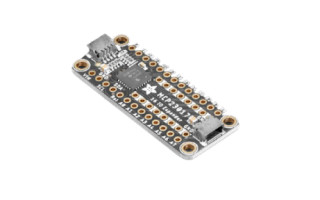Adafruit Unveils the MCP23017 I2C GPIO Expander Breakout Board
January 28, 2022
Blog

Adafruit, a US-based embedded electronic device manufacturer, known for its popular development boards, external sensors, and supporting hardware aiding the maker community. A while ago, the manufacturer released a 16-pin integrated circuit based on the MCP23017 I2C input/output port expander. The MCP23017 uses two I2C pins that can be shared with external I2C devices which provides 16 general purpose pins in return.
Adding to the functionality of the hardware, the integrated circuit also provides the ability to give an interrupt via an external pin. An ideal choice for any 3V3 or 5V power supply setup and you can source up to 200mA from the input/output pins.
To meet the increasing request for a breakout board, a couple of weeks back, Adafruit introduced the Adafruit MCP23017 I2C GPIO Expander Breakout. But the manufacturer has gone a step ahead by providing the hardware with STEMMA QT to give the flexibility of a plug-and-play version.
The LED connections can be done through the input/output pins as each GPIO can drive an output current of up to 25mA. Also, each input can behave with an optional pullup. Additionally, there are two IRQ pins that are programmable for which input needs to be traced. With three address pins, there are up to 8 on a single bus for a total of 128 GPIOs on one I2C bus.

Image Credit: Adafruit
When it comes to software support, there comes libraries with examples for Arduino and CircuitPython. However, if you are using any other platform, the MCP23017 is a versatile module for which example codes are easy to find. “You can also free-wire buttons by connecting one side to the GPIO (set as input with pullup) and the other side to a ground pad,” the manufacturer explains.
If you plan to work on a breakout board, then note that the hardware can be connected through two sticks of headers making it breakout board friendly. When it comes to building a project, the custom-made PCB in STEMMA QT form factor makes it easy to interface. The connectors are compatible with SparkFun Qwiic I2C connectors allowing you to make solderless connections between the MCU board and MCP23017 hardware while enabling you to interface a wide range of sensors and accessories using a compatible cable.
Currently there is no option of SPI input/output port expander integrated circuit and a breakout board. But it would be interesting to see if that’s what the community expects the manufacturer to design. If you are interested, the independent integrated circuit is listed at $2.95 while the breakout board is priced at $5.95.





